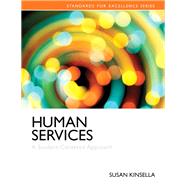NOTE: This is the bound book only and does not include access to the Enhanced Pearson eText. To order the Enhanced Pearson eText packaged with a bound book, use ISBN: 0133824039.
Teaches students how to master Human Service competencies.
Based on student ideas over the past 30 years, Human Services: A Student Centered Approach provides the tools to master the knowledge, values, and skills of the Human Service profession. Readers will gain the skills needed to practice beginning level intervention skills with individuals, groups, families, and the community. Historical contributions of U.S. and global social programs serve as a strong foundation for the understanding of human services.
Standards for Excellence Series - Designed to help students advance their knowledge, values, and skills, the Standards for Excellence Series assists students in associated CSHSE's National Standards to all levels of human service practice. The Standards for Excellence grid at the start of the book provides a quick view of the CSHSE Standards addressed in each chapter.
Improve mastery and retention with the Enhanced Pearson eText
The Enhanced Pearson eText provides a rich, interactive learning environment designed to improve student mastery of content. The Enhanced Pearson eText is:
- Engaging. The new interactive, multimedia learning features were developed by the authors and other subject-matter experts to deepen and enrich the learning experience.
- Convenient. Enjoy instant online access from your computer or download the Pearson eText App to read on or offline on your iPad® and Android® tablet.*
- Affordable. Experience the advantages of the Enhanced Pearson eText along with all the benefits of print for 40% to 50% less than a print bound book.
*The Pearson eText App is available on Google Play and in the App Store. It requires Android OS 3.1-4, a 7” or 10” tablet, or iPad iOS 5.0 or later.








